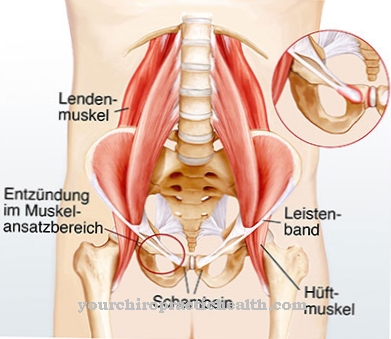The Leaky Gut Syndrome is characterized by a loss of permeability in the intestinal wall. Transmitted toxins and bacteria cause an inflammatory reaction of the whole body with the "Leaky Gut". The syndrome is not a medically or scientifically recognized disease, but an alternative medical hypothesis.
What is leaky gut syndrome?

© Sebastian Kaulitzki - stock.adobe.com
The Leaky Gut Syndrome describes a hypothetical, medically unrecognized condition. Naturopaths and nutritionists developed the theory. The hypothesis focuses on the permeability of the human intestine.
Due to its selectively permeable properties, the intestinal wall of a healthy person represents a barrier that only allows certain substances to pass through and thus absorbs them into the organism. In patients with leaky gut syndrome, the permeability of the intestinal wall is said to be greatly increased. The result is a loss of selectivity, which seems to affect primarily the intestinal wall of the small intestine.
The hypothesis establishes a causal connection between increased permeability of the intestinal wall and a large number of diseases. Among other things, rheumatoid arthritis, chronic fatigue, migraines, multiple sclerosis and autism are said to be favored by the leaky gut syndrome. Little evidence exists to support the hypothesis.
causes
According to the hypothesis, the leaky gut syndrome is due to different factors. These factors include, for example, bacteria and yeasts of the genus Candida, the excessive growth of which is said to disturb the permeability of the intestinal wall. According to supporters of the theory, poor diet and poisoning from excessive antibiotic or alcohol consumption also cause selectivity losses in the intestinal wall.
This creates “gaps” in the natural barrier, especially in the area of the small intestine. Instead of just absorbing water and the nutrients dissolved in it into the blood, the intestinal wall allows numerous proteins, toxins and bacteria from the inside of the intestine to pass into the bloodstream.
According to the theory, this transfer of harmful substances causes a chronic inflammatory reaction in the whole body, which is triggered by immunological reactions. In this way, a broad spectrum of secondary diseases is favored. Autoimmune diseases in particular are associated with leaky gut syndrome in this context.
Symptoms, ailments and signs
According to the hypothesis, patients with leaky gut syndrome suffer from a broad spectrum of symptoms, which can range from chronic joint pain to muscle pain and impaired concentration. In addition to flatulence and migraines, mood swings, depression, nervousness, and skin conditions such as acne have been linked to the syndrome.
The same applies to eczema and susceptibility to infection, which is due to a weakened immune system. The infections are often recurring bladder and vaginal infections. In addition, many patients suffer from chronic states of fatigue and food intolerances such as gluten or lactose intolerance.
In addition, there are often irritable bowel complaints that can develop over the years to chronic inflammatory bowel disease, Crohn's disease or ulcerative colitis. Allergies, asthma and autoimmune diseases such as multiple sclerosis are said to be caused by the syndrome.
Diagnosis and course of disease
Leaky Gut Syndrome is not a recognized medical or scientific disease. For this reason, conventional doctors do not diagnose a “leaky gut” (permeable intestine). Usually, the diagnosis is made by alternative practitioners or nutritionists instead.
Only the alleged consequences of leaky gut syndrome are diagnosed by a doctor, such as the inflammatory bowel disease Crohn's disease. The prognosis for patients with leaky gut syndrome is excellent, according to the hypothesis. Not only can the syndrome be cured with simple means.
Any secondary illnesses should also disappear after the "Leaky Gut" has been rectified.For many patients with incurable autoimmune diseases, the leaky gut hypothesis is therefore a gladly accepted glimmer of hope.
Complications
The leaky gut syndrome causes a porous intestinal mucosa, which mainly affects the small intestine and is seen as a contributor to various chronic diseases, allergies and incurable autoimmune diseases. As long as the natural barrier of the intestinal mucosa is intact, only nutrients and water are released into the bloodstream. With leaky gut syndrome, however, holes appear in the intestinal barrier and undigested substances, toxins and fungi enter the bloodstream, causing numerous complications.
The body's own defense begins to work against itself and an immune reaction is the result. If those affected notice inexplicable bouts of tiredness, food intolerance, loss of strength, gastrointestinal problems and an increase in infections, a medical evaluation should take place. Otherwise, the syndrome can inflame the thyroid and pancreas.
Diseases such as rheumatoid arthritis, diabetes and multiple sclerosis are threatened. Those affected who have a genetic predisposition such as celiac disease or who suffer from acne, allergies, neurodermatitis, asthma, osteoporosis and are exposed to severe stress are more likely to develop leaky gut syndrome. In the laboratory, the clinical picture can be examined and proven in detail using blood, urine and stool samples.
A special note in this regard are increased liver and zonulin values as well as the detection of alpha-1-antitrypsin. In addition to medical therapy, a radical gluten-free and sugar-free diet is recommended as part of a paleo diet, in which artificial additives must also be avoided.
When should you go to the doctor?
Typical warning signs such as stomach pain, flatulence, migraines or a gluten or lactose intolerance indicate a leaky gut syndrome, which must be examined by a doctor. If there are signs of irritable bowel syndrome or another bowel disease, medical advice is also required. In particular, longer-lasting complaints that cannot be traced back to a specific trigger must be examined by a doctor and treated if necessary. People who have already suffered poisoning from alcohol or antibiotics are particularly prone to developing leaky gut syndrome.
The syndrome is also relatively common in connection with autoimmune diseases. Anyone who belongs to these risk groups should definitely go to the responsible doctor with the symptoms mentioned. In addition to the family doctor, a gastroenterologist or internist can be called in. The doctor will consult other doctors depending on the severity of the symptoms. Chronic joint or muscle pain, for example, has to be treated by an orthopedic surgeon, while mental disorders such as depression or fears have to be dealt with in the context of psychotherapy.
Treatment and therapy
The therapy of leaky gut syndrome starts with the substances that originally disrupted the permeability of the intestinal wall. These substances must be consistently avoided in the future. Above all, products containing gluten and lectin, such as cereal and whole grain products, are being removed from the menu. Bread, pasta or legumes are prohibited for the time being.
This also applies to a limited extent to nightshade plants such as potatoes, peppers and tomatoes. In addition, certain vegetable oils, dairy products and flours are taboo for the time being. This change affects the eating habits relatively deeply and is therefore carried out under the professional supervision of a nutritionist.
According to supporters of the hypothesis, changing to a so-called paleo or Stone Age diet promises lasting success, as the intestinal mucosa can regenerate in this way. Grain and dairy products are replaced by vegetables, game, fish or seafood, fruit, eggs, nuts, honey and herbs.
In addition to the change in diet, various probiotics and herbal remedies are propagated as supportive treatment measures. There is little evidence to support the usefulness of the treatments on the intestinal mucosa. Doubters point out that nutritionists and alternative medical professionals have created a new area of application with the leaky gut hypothesis.
Behind the leaky gut syndrome, they suspect an elaborately structured marketing strategy for various natural remedies and related products. Since the change in diet in the context of leaky gut syndrome only has to be carried out under the supervision of a nutritionist and the industry benefits from these instructions, all doubters have strong arguments. At least one should talk to a conventional doctor about planned measures such as a change in diet or fears of a loss of intestinal wall permeability.
You can find your medication here
➔ Medicines to strengthen the defense and immune systemOutlook & forecast
The chances of finding help with leaky gut syndrome are not the same everywhere. The problem is that the diagnosis is controversial among medical professionals. The symptoms of leaky gut syndrome are therefore often not taken seriously. The result is a wrong diagnosis of irritable bowel syndrome. Many of those affected do not even go to the doctor with their symptoms. In this case, the chances of an improvement in the symptoms are poor.
Since the intestine is damaged over the long term in leaky gut syndrome, it is a good idea to see a naturopath. Because through the permeable intestine, breakdown products, allergens and toxins from food can pass unhindered into the bloodstream. This leads to inflammation and other secondary diseases.
Since leaky gut syndrome can be clearly diagnosed through various examinations, the prognosis is good in itself. The leaky gut syndrome can be treated well through a sensible diet, avoidance of the possible triggers and beneficiaries and, if necessary, the administration of medication. The more natural the food, the better it is for the damaged intestine.
Moderating excessive sport or reducing stress factors is also important for a good prognosis. The determination of intolerance to food or food components can also improve the prognosis. Eating high-fiber foods is just as important in Leaky Gut Syndrome as prebiotics and probiotics.
prevention
According to the theory, the leaky gut syndrome can be prevented. As one of the most important preventive measures, supporters of the hypothesis propagate the correct diet, as it can be developed in the company of a nutritionist. In addition, the market is now flooded with various natural remedies that are intended to prevent the loss of permeability. However, most manufacturers do not guarantee full prevention, as the syndrome can be due to a large number of different factors, according to its supporters.
Aftercare
Follow-up care for leaky gut syndrome is usually relatively difficult, as it is a hereditary disease that cannot be completely cured. The affected person is dependent on intensive and comprehensive treatment in order to permanently alleviate all symptoms. If you want to have children, genetic testing and counseling should always be carried out so that the syndrome itself does not recur in the children.
The life expectancy of the person affected may be limited due to the disease. Most symptoms can be relieved with the help of a proper diet, although the sufferer should generally follow a healthy lifestyle with a healthy diet. Regular sporting activities can also have a positive effect on the course of the disease.
In many cases, the doctor can create a nutrition plan for the patient, which should then be followed. In the case of children, it is above all the parents who have to pay attention to a correct and above all to a balanced diet. The intestines of the person affected should also be examined regularly by a doctor so that there is no further damage. A general prognosis about the life expectancy of the patient can usually not be made in the case of leaky gut syndrome.
You can do that yourself
In addition to the conventional medical treatment of leaky gut syndrome, proper nutrition is a useful supportive measure that the patient can take himself.
First of all, the intestines should be completely cleansed using therapeutic fasting. The patient refrains from solid food for a longer period of time, which must be discussed with the attending physician. The intestine is then built up gradually and slowly. Depending on the diagnosis, the patient consistently foregoes the food or nutritional components that previously triggered the respective symptoms. Both phases - therapeutic fasting and the gradual build-up of the intestinal flora - require a great deal of discipline and perseverance while at the same time the symptoms subside more slowly. The patient should therefore make his everyday life as stress-free as possible. During therapeutic fasting in particular, the patient is often tired and sometimes irritated; the design of everyday life should do justice to both.
In addition, a Leaky Gut Syndrome patient can support the build-up of the intestinal flora by consuming potato and sauerkraut juice. Probiotic yogurts without coloring or preservatives are also a suitable means of self-help.




.jpg)



















.jpg)



